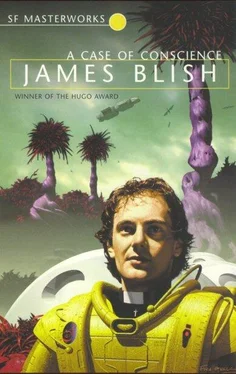“Let’s not get to bickering this early,” Michelis said. “You’ve told us your story without any visible decoration, and it’s evident that you have a reason for confessing. You expect us to excuse you, or at least not to blame you too heavily, when you tell us what that reason is. Let’s hear it.”
“It’s this,” Cleaver said, and for the first time he seemed to become a little more animated. He leaned forward, the glowing gaslight bringing the bones of his face into sharp contrast with the sagging hollows of his cheeks, and pointed a not-quite-steady finger at Michelis. “Do you know, Mike, what it is that we’re sitting on here? Just to begin with, do you know how much rutile there is here?”
“Of course I know,” Michelis said. “Agronski told me, and since then I’ve been working on practicable methods of refining the ore. If we decide to vote for opening the planet up, our titanium problem will be solved for a century, maybe even longer. I’m saying as much in my personal report. But what of it? We anticipated that that would be true even before we first landed here, as soon as we got accurate figures on the mass of the planet.”
“And what about the pegmatite?” Cleaver demanded softly.
“Well, what about it?” Michelis said, looking more puzzled than before.
“I suppose it’s abundant—I really didn’t bother to check. Titanium’s important to us, but I don’t quite see why lithium should be. The days when the metal was used as a rocket fuel are fifty years behind us.”
“And a good thing, too,” Agronski said. “Those old Li-Fluor engines used to go off like warheads. One little leak in the feed lines, and blooey!”
“And yet the metal’s still worth about twenty thousand dollars an English ton back home, Mike, and that’s exactly the same price it was drawing in the nineteen-sixties, allowing for currency changes since then. Doesn’t that mean anything to you?”
“I’m more interested in knowing what it means to you,” Michelis said. “None of us can make a personal penny out of this trip, even if we find the planet solid platinum inside—which is hardly likely. And if price is the only consideration, surely the fact that lithium ore is common here will break the market for it. What’s it good for, after all, on a large scale?”
“Bombs,” Cleaver said. “Real bombs. Fusion bombs. It’s no good for controlled fusion, for power, but the deuterium salt makes the prettiest multimegaton explosion you ever saw.”
Ruiz-Sanchez suddenly felt sick and tired all over again. It was exactly what he had feared had been on Cleaver’s mind; given a planet named Lithia only because it appeared to be mostly rock, and a certain kind of mind will abandon every other concern to find a metal called lithium on it. But he had not wanted to find himself right.
“Paul,” he said, “I’ve changed my mind. I would have caught you out, even if you had never blundered against your ‘pineapple.’ That same day you mentioned to me that you were looking for pegmatite when you had your accident, and that you thought Lithia might be a good place for tritium production on a large scale. Evidently you thought that I wouldn’t know what you were talking about. If you hadn’t hit the ‘pineapple,’ you would have given yourself away to me before now by talk like that. Your estimate of me was based on as little observation as is your estimate of Lithia.”
“It’s easy,” Cleaver observed indulgently, “to say ‘I knew it all the time’—especially on a tape.”
“Of course it’s easy, when the other man is helping you,” Ruiz-Sanchez said. “But I think that your view of Lithia as a potential cornucopia of hydrogen bombs is only the beginning of what you have in mind. I don’t believe that it’s even your real objective. What you would like most is to see Lithia removed from the universe as far as you’re concerned. You hate the place. It’s injured you. You’d like to think that it doesn’t really exist. Hence the emphasis on Lithia as a source of munitions, to the exclusion of every other fact about the planet; for if that emphasis wins out, Lithia will be placed under security seal. Isn’t that right?”
“Of course it’s right, except for the phony mind reading,” Cleaver said contemptuously. “When even a priest can see it, it’s got to be obvious—and it’s got to be written off by impugning the motives of the man who saw it first. To hell with that. Mike, listen to me. This is the most tremendous opportunity that any commission has ever had. This planet is made to order to be converted, root and branch, into a thermonuclear laboratory and production center. It has indefinitely large supplies of the most important raw materials. What’s even more important, it has no nuclear knowledge of its own for us to worry about. All the clue materials, the radioactive elements and so on, which you need to work out real knowledge of the atom, we’ll have to import; the Snakes don’t know a thing about them. Furthermore, the instruments involved, the counters and particle-accelerators and so on, all depend on materials like iron that the Snakes don’t have, and on principles that they don’t know, ranging all the way from magnetism to quantum mechanics. We’ll be able to stock our plants here with an immense reservoir of cheap labor which doesn’t know, and—if we take proper precautions—never will have a prayer of learning enough to snitch classified techniques.
“All we need to do is to turn in a triple-E Unfavorable on the planet, to shut off any use of Lithia as a way station or any other kind of general base for a whole century. At the same time, we can report separately to the UN Review Committee exactly what we do have in Lithia: a triple-A arsenal for the whole of Earth, for the whole commonwealth of planets we control! Only the decision becomes general administrative property back home; the tape is protected; it’s an opportunity it’d be a crime to flub!”
“Against whom?” Ruiz-Sanchez said.
“Eh? You’ve lost me.”
“Against whom are you stocking this arsenal? Why do we need a whole planet devoted to nothing but making fusion bombs?”
“The UN can use weapons,” Cleaver said drily. “The time isn’t very far gone since there were still a few restive nations on Earth, and it could come around again. Don’t forget also that thermonuclear weapons last only a few years—they can’t be stock-piled indefinitely, like fission bombs. The half-life of tritium is very short, and lithium-6 isn’t very long-lived either. I suppose you wouldn’t know anything about that. But take my word for it, the UN police would be glad to know that they could have access to a virtually inexhaustible stock of fusion bombs, and to hell with the shelf-life problem!
“Besides, if you’ve thought about it at all, you know as well as I do that this endless consolidation of peaceful planets can’t go on forever. Sooner or later—well, what happens if the next planet we touch down on is a place like Earth? If it is, its inhabitants may fight, and fight like a planetful of madmen, to stay out of our frame of influence. Or what happens if the next planet we hit is an outpost for a whole federation, maybe bigger than ours? When that day comes—and it will, it’s in the cards—we’ll be damned glad if we’re able to plaster the enemy from pole to pole with fusion bombs, and clean up the matter with as little loss of life as possible.”
“On our side,” Ruiz-Sanchez added.
“Is there any other side?”
“By golly, that makes sense to me,” Agronski said. “Mike, what do you think?”
“I’m not sure yet,” Michelis said. “Paul, I still don’t understand why you thought it necessary to go through all the cloak-and-dagger maneuvers. You tell your story fairly enough now, and it has its merits, but you also admit you were going to trick the three of us into going along with you, if you could. Why? Couldn’t you trust the force of your argument alone?”
Читать дальше











